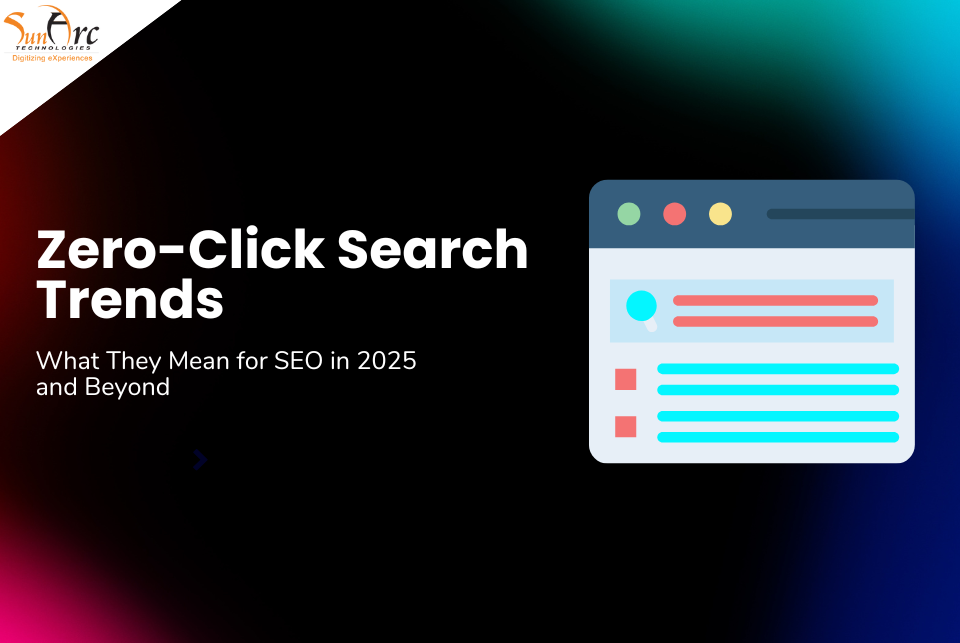Let’s say you Google “how tall is Mount Everest?” and there’s your answer, right at the top of the page. No click. No website visit. Just the info, instantly.
That, right there, is what we call a zero-click search. And it’s quietly changing the rules of search marketing.
Now, if you’re running a business, publishing content, or trying to get traffic from Google, this trend might sound a little scary. After all, how do you win if no one’s clicking?
The good news? You can still win.
But it requires a shift in how you think about visibility, traffic, and SEO as a whole. Let’s unpack exactly what’s happening—and how to adapt.

What is a Zero-Click Search, Really?
Okay, so what are we dealing with?
A zero-click search happens when someone types something into Google (or speaks it into a voice assistant), and they get the answer right there on the search results page—no need to click on anything.
Think:
- A calculator popping up when you type a math equation
- The weather forecast showing before you even finish typing
- Google answering “what is intermittent fasting?” in a neat little paragraph
These aren’t just handy—they’re strategic. Google has loaded its results page with what are called SERP features: things like featured snippets, knowledge panels, People Also Ask boxes, and local map packs.
They’re designed to give users instant answers and keep them on Google’s turf.
And let’s be real—they work. People get what they need in seconds, and most never click through to a site. That’s why this trend isn’t just a fluke. It’s the direction search is heading.
Why Is This Happening—and Why Now?
Let’s zoom out a bit.
Google’s goal is simple: make search faster, easier, and smarter. And the less friction between a question and an answer, the better for the user experience—and for Google’s business.
Plus, think about how we search today:
- We ask Siri and Alexa questions out loud
- We search on tiny phone screens where clicking feels like a chore
- We expect answers in seconds—or we’re gone
So it makes sense that Google’s leaning hard into no-click experiences. And with AI entering the picture (hello, Search Generative Experience), Google can now generate answers on the fly using your content… without always sending traffic back to you.
That’s the game now. And it’s why this zero-click shift isn’t going anywhere.
So Who’s Feeling the Pinch?
If you’re in any of these spaces, you’ve probably noticed something:
- Blog traffic is flatlining
- Affiliate links aren’t converting like they used to
- Your best content is ranking, but… crickets
Sound familiar?
Industries like healthcare, finance, local services, and even e-commerce are especially vulnerable because the answers users want are often short, straightforward, and easy for Google to serve up directly.
But here’s the kicker: even if your site isn’t in one of those industries, the overall search behavior shift affects everyone. Fewer clicks, shorter attention spans, and higher expectations.
This isn’t just a trend—it’s a new mindset users bring to search.
Here’s How to Win in a Zero-Click World
Alright, let’s get into the practical stuff. If people are clicking less, your strategy has to evolve. But it’s not about giving up on SEO—it’s about redefining what success looks like.
1. Stop Chasing Clicks. Start Chasing Visibility.
If your brand shows up as the answer—even without a click—you’ve just earned trust. And in marketing, trust is currency.
You want to be that name users see repeatedly in search results. Because the next time they do need something more? You’re top of mind.
This is a visibility game now. Think presence, not just pageviews.
2. Optimize for Featured Snippets (A.K.A. The Answer Box)
These are prime real estate.
Google pulls featured snippets from high-ranking content that answers questions clearly and directly. So your job?
- Take common questions in your niche and answer them in 40–60 words
- Format your content with proper headers and bullet points
- Add quick definitions, step-by-steps, and short lists
Think of it like this: if Google were hiring a spokesperson for your topic, would your content pass the audition?
3. Use Schema Markup Like You Mean It
Schema markup (aka structured data) tells search engines what your content is—and it’s your golden ticket to rich results.
We’re talking:
- FAQs
- Reviews
- How-tos
- Events
- Local business details
You’re helping Google help you. And when you do it well? Your results stand out visually, even in a crowded SERP.
4. Add FAQ Sections Strategically
Don’t just stick an FAQ at the bottom of the page because “SEO said so.” Build it into your user experience.
Ask yourself: What questions are people genuinely asking at each stage of their journey?
Then bake those answers into your blog posts, landing pages, and even product descriptions.
Google loves pulling FAQs into its People Also Ask boxes and snippets. It’s a subtle, powerful way to win zero-click real estate.
5. Don’t Put All Your Eggs in Google’s Basket
This part’s important.
Google’s great—but it’s not everything. Start treating platforms like YouTube, newsletters, LinkedIn, TikTok, and even Reddit as search engines in their own right.
Because here’s the truth: traffic you own (like your email list) or build through community (like video content or social) is a lot more stable than chasing SERP rankings that can change overnight.
Rethinking Success: What to Track Instead of Clicks
If you’re only watching website visits, you’re missing the full picture.
In the zero-click era, you need to start tracking metrics like:
- Search impressions (how often your content shows up)
- Featured snippet wins
- Brand name search volume
- Engagement on platforms outside of Google
Tools like Google Search Console, Ahrefs, and SEMrush can give you visibility into this—and help you see when your content is working, even without the click.
Looking Ahead: Where Zero-Click Is Going
Spoiler alert: it’s not going away.
With AI-powered summaries (like Google’s SGE and Bing’s Copilot) rolling out more broadly, zero-click answers will only get richer. You might even start seeing paragraph-length summaries or multi-step guides generated by AI—based on your content.
So, what’s the move?
Focus on creating authoritative, structured content that AI can reference. Be the source. That way, even if the machine answers the question, you’re the one providing the answer.
And don’t forget: while zero-click might “take” a visitor, it often gives you brand exposure. Play the long game.
Thoughts
Zero-click search isn’t the villain. It’s the reality.
Yes, it’s changing how people interact with your content. But it’s also opening up new opportunities to build trust, increase visibility, and strengthen your brand in ways that matter more than ever.
Here’s your checklist to stay ahead:
Zero-Click Ready SEO Checklist
- My content answers specific user questions, fast
- I’ve structured pages to win featured snippets
- I’m using schema markup to enhance visibility
- I track impressions, not just traffic
- I’m building brand presence beyond Google
Need help turning your content into a zero-click powerhouse? Want to brainstorm ways to protect your traffic and boost your visibility?
Let’s talk. This is a new SEO era, and you’re not in it alone.

